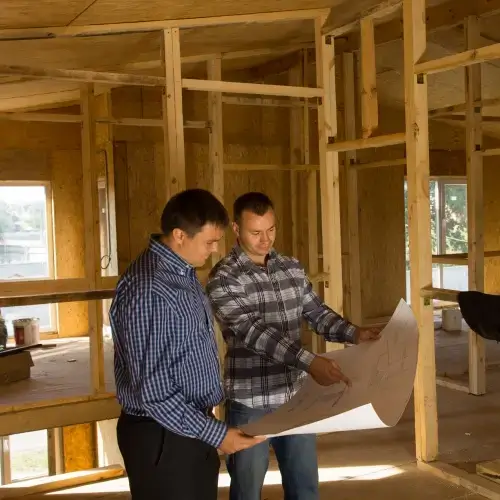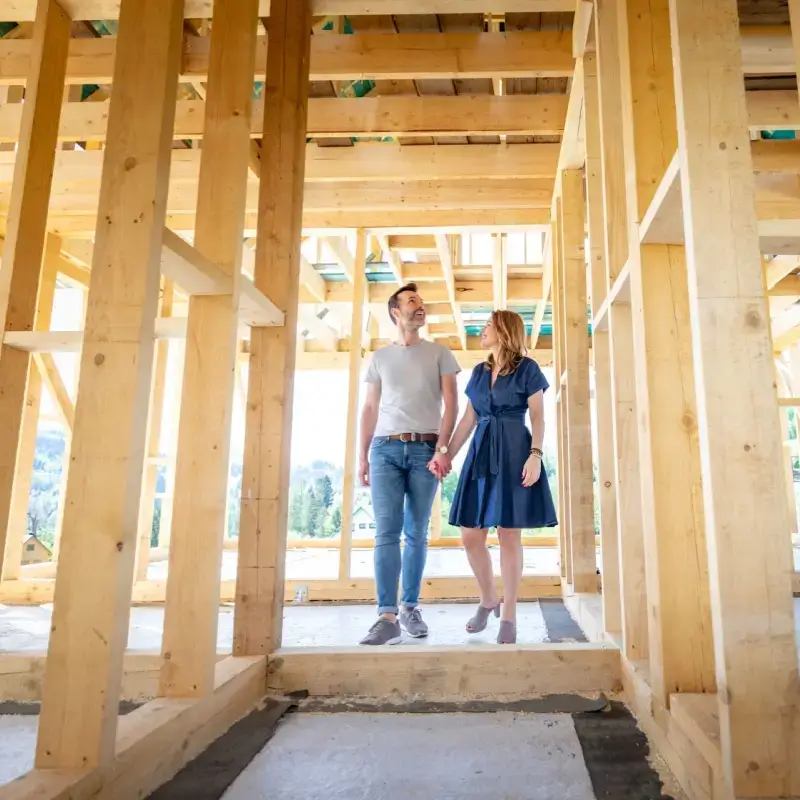Home / Home Loans / Building vs buying a hou…




Key takeaways
- If you’re in the market for a new home, deciding between buying or building can be a tough decision to make.
- Whether you decide to build or buy, neither option will be cheap – you’ll still have a series of significant upfront and ongoing costs.
- You’ll also face a set of pros and cons regardless of whether you choose to build or buy.
Expert tips for deciding on building vs buying a house
Our General Manager of Money, Stephen Zeller, has some tips for prospective builders or buyers to try and help them decide which path to take when it comes to their next (or first) property.

Consider the expenses
Both building and buying will involve multiple ongoing and upfront costs, but they won’t necessarily be the same expenses. Make sure you have a thorough and holistic understanding of both options’ costs and how you’ll cover them before deciding on one over the other.
Think about your future property value
When weighing up the cost of buying an existing home vs the cost of building a home from scratch, think about what kind of sale price you might be able to get in the future. You may think a shiny new home with all the fixings would end up worth more, but you could always make upgrades to an older home down the line to increase its potential purchase price!
Look into available government assistance
Depending on your personal circumstances, you could be eligible for government grants or concessions on your property purchase. For example, if you’re a first home buyer, you could be eligible for the First Home Owners Grant and/or a stamp duty concession. There are also some financial incentives that may be available to those building new homes.
Is it cheaper to build or buy a house?
The costs of building a house
 Prospective home-builders beware, the costs of building a brand new home aren’t anything to sneeze at. Before you even get to your construction costs, you need to find and purchase a block of land to build on – which generally costs hundreds of thousands of dollars alone depending on size and location.
Prospective home-builders beware, the costs of building a brand new home aren’t anything to sneeze at. Before you even get to your construction costs, you need to find and purchase a block of land to build on – which generally costs hundreds of thousands of dollars alone depending on size and location.
Once you do get into the construction phase, you’ll have to contend with the cost of building materials, labour and any optional extras you want incorporated into your new home. You’ll also need to separately consider any painting, decorating and/or landscaping expenses that may be applicable, as these typically won’t form part of your initial construction costs.
The costs of buying a house
When it comes to buying a house, aside from paying the actual purchase price, you’ll typically also have to pay:
- Government costs, including stamp duty and a mortgage registration fee
- Lender fees, including a loan application fee and potentially also valuation fees, document preparation fees and settlement fees.
- Solicitor/conveyancer fees
- Building and pest inspections.
With all these potential costs, you may want to calculate your estimated property-buying costs before you get the ball rolling on your next home purchase.
The pros and cons of building a house
Pro: You can design your dream home
If you’re building your own home, that means you can choose how it looks, how the floor plan is laid out and more. Provided you’ve got the budget to back up your desired choices, this little corner of the world is your oyster!
Pro: You can build a more energy-efficient home
One of the upsides of a new build is that you can incorporate various energy-efficient measures into the house, such as solar panels, the type of insulation you choose, double-glazed windows and energy-efficient lighting.
Making your new home as energy-efficient as possible could help reduce the cost of your energy bills for as long as you live in that house.
Con: Cost and/or timeframe blowouts
If this is your first time building a home from scratch, you may be taken aback by the unexpected costs and delays that can come with the home-building process. Any given construction project could suffer from delays or budget blowouts, so it’s not the end of the world if yours does – just make sure you’re mentally and financially prepared for the stress this could cause!
Con: Land availability
In order to build a new house, you’ll need to find and acquire some vacant land to build it on first. While vacant land may be found here and there in inner-city areas, the vast majority of available land in any given city will be further out, and farther away from the city centre than you may have hoped for. Even if you do find vacant land in your desired suburb, it may not be as large a lot as you’d hoped.
Con: Juggling living costs with your new mortgage
 While your new home is being built, you’ll need somewhere else to live. Depending on your financial situation, you may choose to continue renting or paying the home loan on your current home until your new home is built, or you may choose to stay with family or friends until construction is done.
While your new home is being built, you’ll need somewhere else to live. Depending on your financial situation, you may choose to continue renting or paying the home loan on your current home until your new home is built, or you may choose to stay with family or friends until construction is done.
Whatever your living situation ends up being while construction is happening, you’ll most likely have taken out a construction loan to finance the building of your new home, which you’ll also be paying off at the same time. The good news is that construction loans are typically interest-only during the construction phase, meaning your repayments will only need to cover the interest being charged on the loan rather than that along with the loan principal.
That being said, the size of your construction loan repayments will still depend on your loan amount and its interest rate.
The pros and cons of buying a house
Pro: You know what you’re getting
When buying an existing property, you can examine it, research it and have it inspected from top to bottom, and subsequently come away knowing all there is to know about the property in question. This removes some of the uncertainty you might get with a new build and allows you to understand exactly what you’re paying for.
Pro: A faster and simpler process
Even the most protracted of property purchases will likely take far less time than buying vacant land and building a brand-new home on it. If you’re looking to become a homeowner sooner rather than later, buying may be a more suitable option than building.
Pro: A broader selection of locations
If you’re looking for an established home, you’ll typically have a greater selection of locations to choose from than if you were looking for vacant land to build on. This will be the case even more so in heavily built-up and inner-city areas, in which you’re less likely to find vacant land zoned for low-density residential construction.
Con: Wear and tear
If you’re planning on buying an existing house, you’ll want to keep an eye out for the wear and tear that can come with older homes. Even if you’re only looking at newer homes with not too much damage or wear for the present, it’s always worth considering the maintenance costs you might pay as the owner of any given home.
Con: You’ll typically pay more in fees
While there’s no shortage of costs you’ll pay while building your own home, some fees may end up being higher when buying a house.
For example when considering stamp duty, although you’d still pay stamp duty on the purchase of land you’d be building on, you’d likely be paying more stamp duty for a house purchase, owing to the difference in value between a piece of land and a piece of land with a house on it.
Con: You may have to compromise
One of the most significant downsides of buying an established property instead of building a new one is that you may not find an existing property that ticks all of your ‘dream home’ boxes.
You could always purchase a home and then conduct renovations to get it closer to what you had in mind, but being able to build your dream home from scratch may be a more appealing option depending on what kind of existing properties are currently on the market.
Meet our home loans expert, Stephen Zeller
Stephen has more than 30 years of experience in the financial services industry and holds a Certificate IV in Finance and Mortgage Broking. He’s also a member of both the Australian and New Zealand Institute of Insurance and Finance (ANZIIF) and the Mortgage and Finance Association of Australia (MFAA).
Stephen leads our team of Mortgage Brokers, and reviews and contributes to Compare the Market’s banking-related content to ensure it’s as helpful and empowering as possible for our readers.

